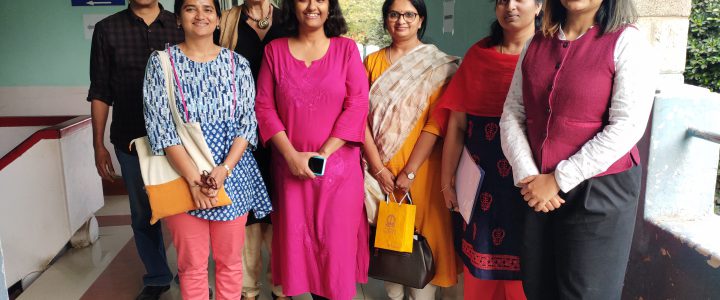
Mohua Chakraborty Choudhury
Visiting scholar
DST-Centre for Policy Research, Indian Institute of Science, Bengaluru
Research Interests:
Mohua works on health policy research focusing on aspects of equitable and inclusive health that can benefit all sections of society. She has specific interest in understanding the challenges faced by the rare disease community in India and identifying the policy and public health interventions that can help to provide better quality of life to such individuals and families. To address these issues, she also takes special interest in analysis of Orphan Drug approval system and Clinical trials data. Further, as a part of the STIP 2020 Secretariat, she has gained first-hand experience of a national policy formulation process.
Background:
Post-doctoral Research Fellow (2019-2020)
Institute of Bioinformatics and Applied Biotechnology, Bengaluru
Involved in a project to quantify the reporting of clinical trials of orphan drugs in clinicaltrials.gov by comparing them with those that were mentioned in FDA approval documents.
National Post-doctoral Fellow (2017-2019)
Institute of Bioinformatics and Applied Biotechnology, Bengaluru
Analyzed clinical trials associated with approval of all the orphan drugs approved by the US-FDA. Captured the present scenario of rare disease treatment and management in India through a series of interviews with key persons in the patient advocacy groups and orphan medicinal product industry. [Related publications: Ref* 1, 2, 3, Presentation 1]
Ph.D in Biotechnology (2011-2015)
Assam University, Silchar
Taxonomic and molecular identification of Indian freshwater fishes along with genomic data analysis and molecular phylogenetic analysis to identify species, developing DNA barcode libraries and resolve discrepancies in species classification.
M.Sc in Bioinformatics (2008-2010)
Banasthali University, Banasthali, Rajasthan
Publications
Choudhury MC, Saberwal G: The work, goals, challenges, achievements, and recommendations of orphan medicinal product organizations in India: an interview-based study.Orphanet Journal of Rare Diseases 2019; 14:241
Choudhury MC, Saberwal G: The role of patient organizations in the rare disease ecosystem in India: an interview-based study.Orphanet Journal of Rare Diseases 2019; 14:117
Choudhury MC, Saberwal G: Patient advocacy.Current Science 2019; 3:116
Chakraborty M, Dhar B, Ghosh SK. Design of character‐based DNA barcode motif for species identification: A computational approach and its validation in fishes. Molecular Ecology Resources 2017;17:1359–1370.
Chakraborty M, Ghosh SK: An assessment of the DNA barcodes of Indian freshwater fishes. Gene 2014, 537(1):20-28.
Chakraborty M, Ghosh SK: Unraveling the sequence information in COI barcode to achieve higher taxon assignment based on Indian freshwater fishes. Mitochondrial DNA 2014, 0(0):1-3
Dhar B, Chakraborty M, Devi NN, Malvika S, Chakraborty M, Trivedi S, Aloufi AA, Ghosh SK Molecular Identification of Reptiles from Tabuk Region of Saudi Arabia Through DNA Barcoding: A Case Study. In: DNA Barcoding and Molecular Phylogeny. Edited by Trivedi S., Rehman H., Saggu S., Panneerselvam C., Ghosh S. Springer International Publishing 2018, 397-411
Chakraborty M, Ghosh SK, Khomdram B: Revealing the genetic diversity of Clarias batrachus using DNA barcode. Journal of Environment and Socio-biology 2013, 10(1):25-32.
Chakraborty M, Chatterjee A, Krithika S, Vasulu TS: A Statistical Analysis of MicroRNA: Classification, Identification and Conservation Based on Structure and Function. In: Growth Curve and Structural Equation Modeling: Topics from the Indian Statistical Institute. Edited by Dasgupta R. Cham: Springer International Publishing 2015, 223-258
Mahadani P, Devi KM, Das MM, Chakraborty M, Rahman F, Hansa J, Ghosh SK: Bioinformatics in DNA Barcoding. In: A text book on DNA Barcoding 2013, ISBN 81- 922989-4-8.
Talukdar FR, Ghosh SK, Laskar RS, Mahadani P, Chakraborty M, Dhar B, Bhattacharjee MJ: Implication of nucleotide substitution at third codon position of the DNA barcode sequences. Journal of Environment and Socio-biology 2013, 10(1):55-63.
Sengupta A, Vasulu TS, Varshney M, Mohapatra R, Chakraborty M: Statistical Analysis of Human miRNA. Proceedings of the Ninety ninth Session of the Indian Science Congress Section of Mathematical Sciences; Bhubaneshwar 2012.
Ghosh SK, Bhattacharjee MJ, Ksh MD, Ahanthem M, Kundu S, Mahadani P, Dhar B, Khondram B, Chakraborty M, Rahman F, Mondal R, Hansa J, Laskar RS, Mazumdar TH, Sarkar P, Rajbonshi S, Chakraborty A, Das MM, Ghosh PR, Das KC and Laskar BA: DNA Barcoding: Digital Taxonomy of Bioresources. Strategic Physiological Research for Sustainable Animal Biodiversity 2011, 268-275.




 Prof. Dominique Babini
Prof. Dominique Babini Prof. Arianna Becerril García
Prof. Arianna Becerril García 














